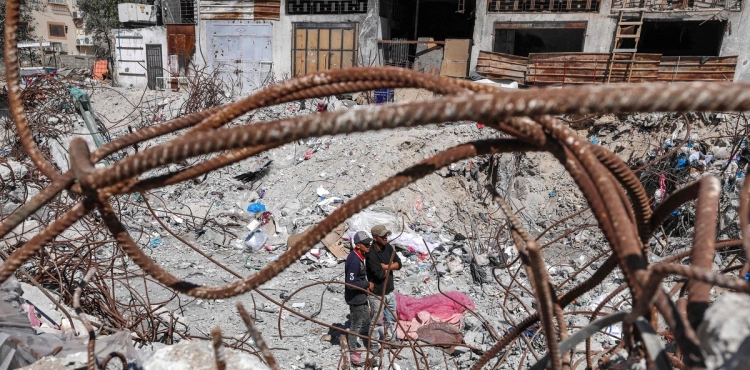One year after the Israeli aggression on Gaza, Hamas seeks to revive the faltering economy in the besieged strip and rebuild what was destroyed during 11 days of Israeli bombardment on Gaza.
At 6 p.m. on May 10, 2021, Hamas and Islamic Jihad launched hundreds of rockets at Israel, following a threat issued by the spokesman of the Al-Qassam Brigades, the military wing of Hamas, in which he demanded that the Israeli police “withdraw” the Israeli police from Al-Aqsa Mosque and the Sheikh Jarrah neighborhood in Jerusalem.
This was preceded by several weeks of clashes with the occupation police in Jerusalem, due to an Israeli threat to expel several Palestinian families from their homes in the Sheikh Jarrah neighborhood of the city.
During the 11 days of the military confrontation, which is considered the heaviest in years, 260 Palestinians were martyred, including 66 children. On the Israeli side, 14 people were killed, including a child, a girl and a soldier.
The Israeli occupation army said that the "Iron Dome" system to intercept missiles intercepted about 90 percent of the resistance´s rockets fired at the Jewish state.
The confrontation extended to the occupied interior, where confrontations erupted between Palestinians and Jews, in addition to confrontations in the occupied West Bank.
During the war, Israel completely destroyed 1,600 Palestinian homes in the Gaza Strip, while more than sixty thousand other homes in the Gaza Strip, which Israel has imposed a tight siege on for more than fifteen years, were partially or massively damaged.
After the truce agreement reached by Israel and Hamas, mediated by Egypt and others, entered into force, the Egyptian president pledged to pay $500 million and Qatar two for the purpose of rebuilding the Gaza Strip, whose area does not exceed 360 km.
But the rebuilding process is still slow, according to Naji Sarhan, the undersecretary of the Ministry of Housing and Public Works in the Hamas-run Gaza Strip.
Sarhan attributes this to "political and financial reasons" without providing further details.
Sarhan states that the Egyptian grant is "going well".
He points out that "our priority in distributing the Egyptian grant apartments will be for those whose homes were demolished during the last war, and those with limited income and poor families."
Egypt is currently building, in the north and center of the sector, three residential cities comprising about two thousand housing units.
The Undersecretary expects, "the reconstruction of 500 homes will be completed by the middle of this year, which is a third of the total number of demolished homes."
2.3 million Palestinians live in the Strip, about two-thirds of whom are poor refugees.
The United Nations Relief and Works Agency for Palestine Refugees (UNRWA) is responsible for the reconstruction and reconstruction of the homes of the affected refugees in the Strip.
According to the agency’s spokesman in Gaza, Adnan Abu Hasna, it has completely completed the file of partial damage, and this file includes 7,000 homes that sustained minor, medium or severe damage.
Hamas sources had previously announced that they had informed, through Egyptian and Qatari mediators, Israel´s intention to raise the quota of Gaza workers´ permits to 20,000, with 8,000 new permits, due to the "security stability" that prevails in the region.
According to the Herbert C. Kelman Institute´s Middle East expert, Ofer Zalzberg, "Hamas leaders outside Gaza, like Saleh al-Arouri (the movement´s deputy head), think ideologically and believe that the strategy should not focus on Gaza."
As for the professor of political science in Gaza, Jamal Al-Fadi, he believes that Hamas faces "big challenges represented in calm and resistance."
He added to Agence France-Presse that among the challenges are also "the settlers´ incursions into Al-Aqsa Mosque and the tension in the West Bank and Jerusalem, and at the same time will Hamas choose calm in exchange for improving the economy, which is facing great difficulties" in the Strip.
Economically, the Palestinian economic expert Omar Shaaban asserts that "the occupation will monitor the prevention of an explosion in Gaza through some economic facilities and an increase in the number of workers."
Shaaban expects the reconstruction process in Gaza to remain "slow unless a political track and security stability are reached."
This, according to Shaaban, "requires Palestinian-Palestinian reconciliation" because "the world is tired of rebuilding what is destroyed every time before a new confrontation erupts."












